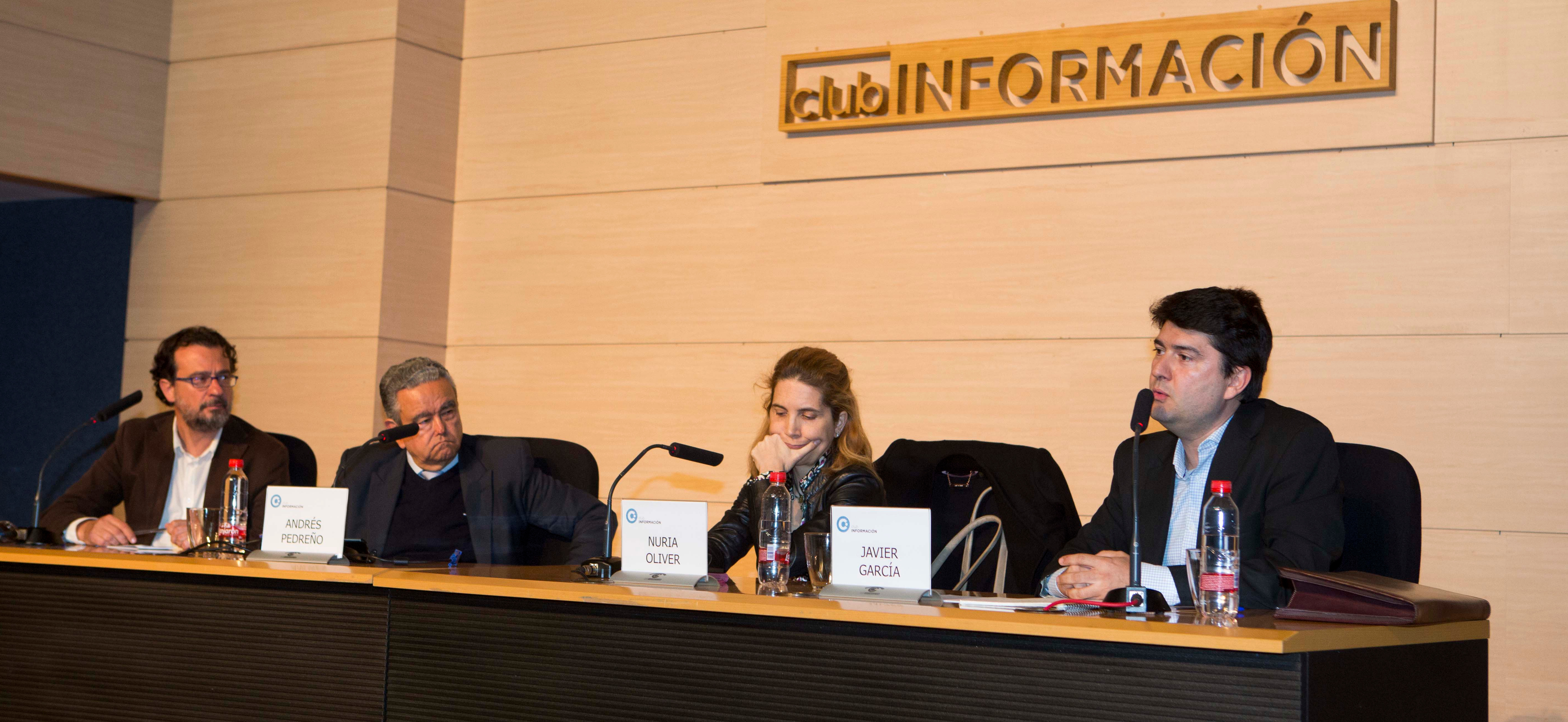
The anglicism "storytelling", the art of telling stories to influence decisions, has long been leaping from the world of marketing into the vocabulary of other fields. Now it is the turn of science. Three outstanding researchers, Javier García, Andrés Pedreño and Nuria Oliver, gathered together in the Club INFORMATION of Alicante, agreed that science is fighting an unequal and necessary battle to communicate and make itself understood. It is a matter of occupying a space in the public's mental map in accordance with the impact that science and technology have on the public's minds. technological revolution will bring into their lives.
"Scientists talk too much about what we do and confuse people with figures, when it's the stories that are convincing," said the professor at the European University of Science and Technology. Rafael del Pino Foundation and Jaume I prize, Javier García. The director of the Laboratory of Molecular Nanotechnology at the University of Alicante cited Swedish teenage activist Greta Thunberg as someone capable of mobilising society through a well-told story.
Inspiring communication
Engineer and Head of Data Science Research at Vodafone, Nuria OliverHe called for a "inspirational communicationThe "gender imbalance" in the current "gender gap" in the technical and scientific professions. Oliver, who also serves as chief data scientist at the Data-Pop Alliance, a global coalition to reconcile Big Data and development, argued for the positive impact that data science can have on the world's development. social good and for the achievement of the United Nations Sustainable Development Goals (SDGs).
"Data on human behaviour can not only help us measure the status of the SDGs in certain places, but can also directly help us meet the goals," he said. The researcher from Alicante He gave as an example the objective of combating poverty, whose diagnosis has become more immediate and effective thanks to data engineering, as well as public health, the climate change or sustainable transport, all areas in which Oliver has worked "personally".
For his part, the former rector of the University of Alicante and president of the technology association AlicanteTEC, acknowledged the need to seek allies in the field of social communication to promote scientific vocations among young people and to respond to the needs posed by the digital transformation. "The system needs 1,250,000 new professionals trained in STEM (Science, Technology, Engineering and Mathematics) disciplines," he said. The former CEO of Universia stated that "a television series" can effectively contribute to the science communication.
For Andrés Pedreñocommunication and education" are key to the new economic scenarios arising from the digital transformation. Hence the importance of ensuring equal opportunities The European Commission's research programme is based on access to training and the commitment of the universities and the scientific community to research that is a priority for society. "We must demand efficiency in spending, generate talent and promote the creation of networks and technological nodes," he said.
Three proposals

Nuria Oliver
Computational thinking
Vodafone's Director of Data Science Research threw down the gauntlet to the education officers. "Computational thinking should be a core subject with five years for the skills acquisition"said Nuria Oliver. In her opinion, the massive transformation of the labour market will result in the creation of millions of jobs with technological content. In view of this fact, future professionals must be initiated into a "scientific mindset", but also "cultivate creative and emotional skills".
Andrés Pedreño
Ethical principles
The former rector of the University of Alicante acknowledged that the situation brought about by the technological disruption It presents many "layers of complexity" and represents "a huge leap for humanity with an intensity of time never experienced before". He therefore recommended freeing the education system of insubstantial debates and to "copy the good education systems". "Our times are complex, which is why we need to approach change with ethical principles. The cohesion and solidity of social structures depend on it," he said.
Javier García
Fight against fake news
"Fake news is not lies. Lies are something else. Behind these fake news stories there is a strategy". The AU researcher recalled that 40 percent of French people distrust the safety of vaccines and only 66 percent of young people in the United States claim that the earth is round. "We are all more comforted by a lie than by a demanding truth," he said. His recipe for combating this communication epidemic has three components: the emotional power of storiesmethodical doubt as a value, and the capacity of science to confront fanaticism.


